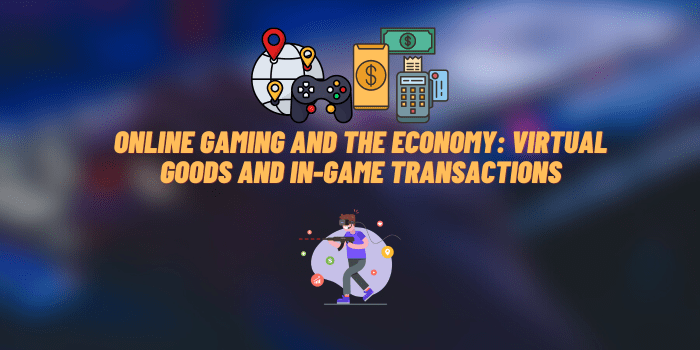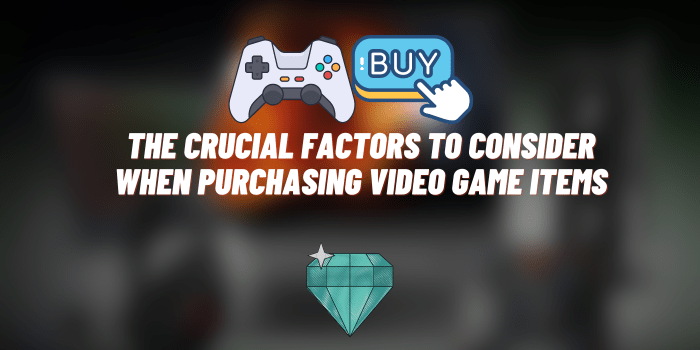Online Gaming and the Economy: Virtual Goods and In-Game Transactions
Online gaming has become a significant source of entertainment for millions of people worldwide. However, it has also become a significant contributor to the global economy. With the advent of virtual goods and in-game transactions, online gaming has become a thriving industry.
But, people are still unaware of the potential of online gaming. Some think it’s a waste of time, and others don’t value it as a profession. However, once you scratch the surface, there is much to gain from it.
Virtual Goods: What are they?

Virtual goods are digital items that can be bought or sold within a game. These items include in-game currency, virtual pets, virtual clothes, and weapons. They are not tangible and exist solely within the game’s virtual world.
Players can acquire virtual goods by either playing the game or purchasing them using real money. The rise of virtual goods has changed the landscape of the gaming industry and created new opportunities for players, developers, and investors.
In-Game Transactions: A New Economy
In-game transactions refer to any purchase made within the game, whether it is for virtual goods, in-game currency, or other items. The rise of in-game transactions has created a new economy within the gaming industry. The economy is based on players’ willingness to spend real money on virtual items, which can be used to enhance their gaming experience. Developers constantly create new virtual goods and in-game currency to keep players engaged and willing to spend.
The Rise of the Gaming Industry

In 2020, the global gaming industry was worth approximately $203 billion, and it is expected to reach $315.90 billion by the end of 2023. The industry’s growth can be attributed to the rise of online gaming and the increasing popularity of virtual goods and in-game transactions. Online gaming has become a significant part of the entertainment industry, with millions of people worldwide playing games on various platforms.
Now, countless websites offer gaming gift cards that you can use to get on with your gaming journey.
Online gaming has become a massive industry, with virtual goods and in-game transactions playing an increasingly important role in driving its growth. Thanks to innovative platforms like CoinGate, purchasing these items has always been challenging. With a range of flexible and secure payment options, including buying an Blizzard gift card, it is quickly becoming the go-to solution for gamers looking to get the most out of their online gaming experiences.
The Economic Impact of Virtual Goods and In-Game Transactions
Virtual goods and in-game transactions have significantly impacted the global economy. The rise of virtual goods has created a new market where players can spend real money on virtual items. In 2020, the virtual goods market was worth approximately $203 billion and was expected to rise by 20% by 2028. This growth has been driven by the increasing popularity of online gaming and the willingness of players to spend money on virtual items.
The gaming industry’s economic impact extends beyond the virtual goods market. In-game transactions have created new revenue streams for game developers, publishers, and investors. The industry has also created job opportunities for game developers, graphic designers, and other professionals. The industry’s growth has contributed to the global economy, with the gaming industry expected to generate approximately $300 billion in revenue by 2023. In times when people are dealing with massive layoffs – the gaming industry is creating tons of jobs for people.
The Social Impact of Virtual Goods and In-Game Transactions

Virtual goods and in-game transactions have impacted not only the economy but also the social fabric of society. Online gaming has become a social activity, with players from around the world coming together to play games and interact with each other. The rise of virtual goods has created new ways for players to express themselves within the game’s virtual world. Players can purchase virtual clothes, accessories, and other items to personalize their gaming experience.
The social impact of virtual goods and in-game transactions can also be seen in the rise of esports. Esports is a form of competitive gaming where players compete against each other for cash prizes. Esports has become a significant part of the gaming industry, with millions of people tuning in to watch esports events. Esports has created new opportunities for professional gamers, with some players earning millions of dollars in prize money.
Moreover, online gaming and transactions allow players to socialize with people worldwide, regardless of their location or background. This can help to build social skills and improve communication, which is essential for building relationships in the real world.
Conclusion
Online gaming has become a significant player in the global economy, with virtual goods and in-game transactions driving revenue growth for the gaming industry. With the advancements in technology and the increasing number of gamers worldwide, the future of virtual goods and in-game transactions looks promising.
As gamers continue to invest in their gaming experiences, we can expect to see new and innovative ways for them to spend money on virtual goods, including new payment methods and platforms. Most importantly, it also positively affects society.






